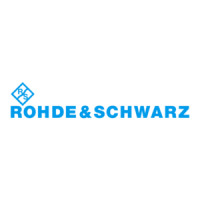Avionic Standards
R&S
®
SMA100B
149User Manual 1178.3834.02 ─ 05
Settings
● General Settings................................................................................................... 149
● COM/ID Settings................................................................................................... 151
5.5.1 General Settings
Access:
► Select "ADF > General".
This dialog comprises general settings of the ADF standard, the default and the
"Save/Recall" settings.
By default, an ADF signal modulation is set on an RF carrier with a frequency of
190 kHz. The COM/ID signal has 1.02 kHz frequency.
If enabled, the avionic standard modulation is displayed in the "Modulation" tile as
follows:
● "Avionic: VOR" for enabled VOR modulation
● "Avionic ILS: Glide Slope/Localizer/Marker Bcn" for enabled ILS glide slope/
localizer/marker beacons modulation
● "Avionic: ADF" for enabled ADF modulation
ADF state and carrier frequency range
If the R&S SMA100B carrier frequency is outside the specified ADF frequency range
from 190 to 1750 kHz, a settings conflict is displayed. Activating the ADF is not possi-
ble. Change the carrier frequency to a value within the specified frequency range.
Changing a parameter in the avionic standards causes an instant signal change in the
R&S SMA100B. There is no extra measurement cycle to calculate the RMS value of
the baseband signal to set the correct RF level.
If the avionics standard is activated for the first time, or after every subsequent on/off
sequence, the measurement cycle will take place to determine the correct RF level.
Every subsequent parameter change in the avionic standard is performed without
another measurement cycle to provide a continuous signal output.
ADF Configuration and Settings

